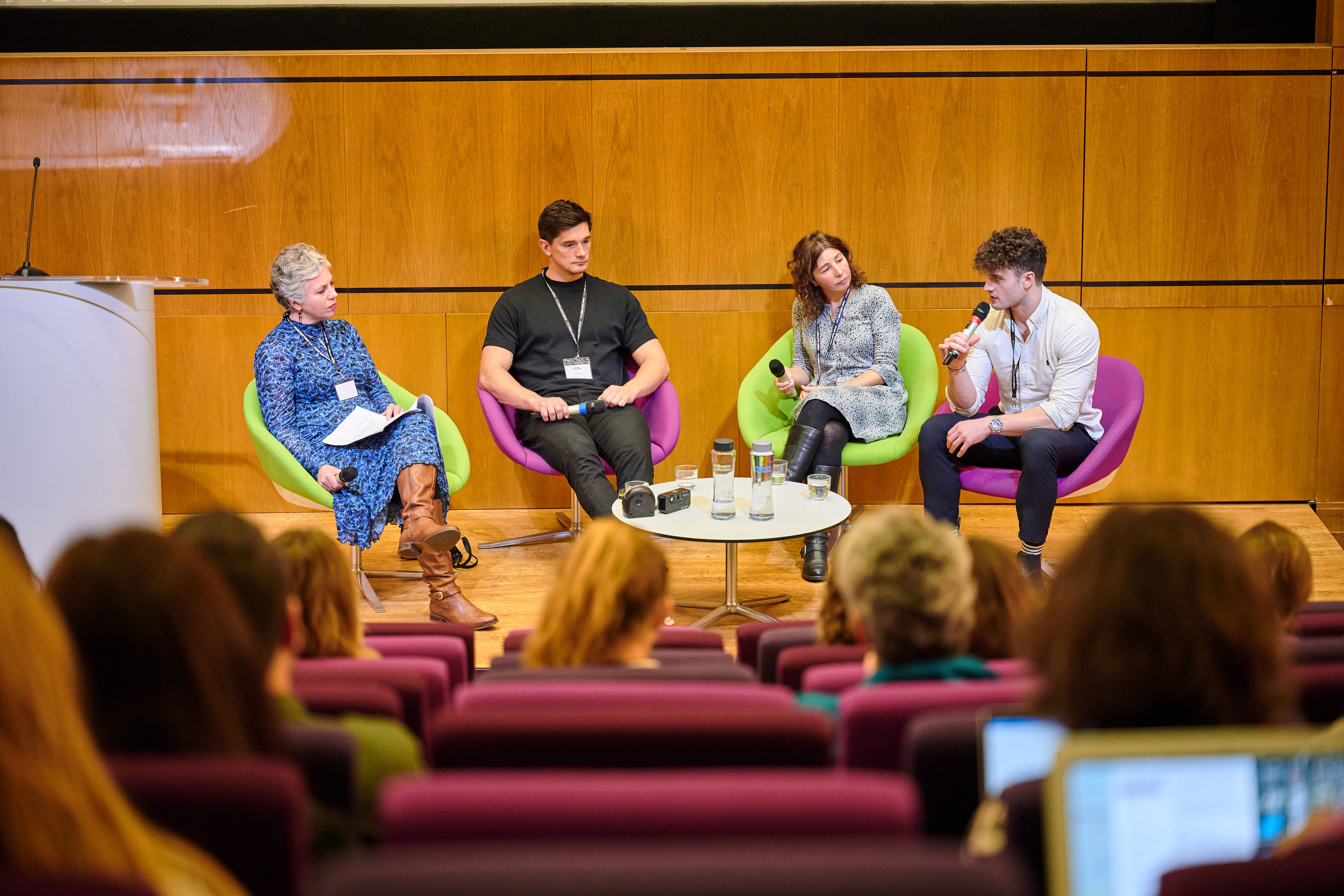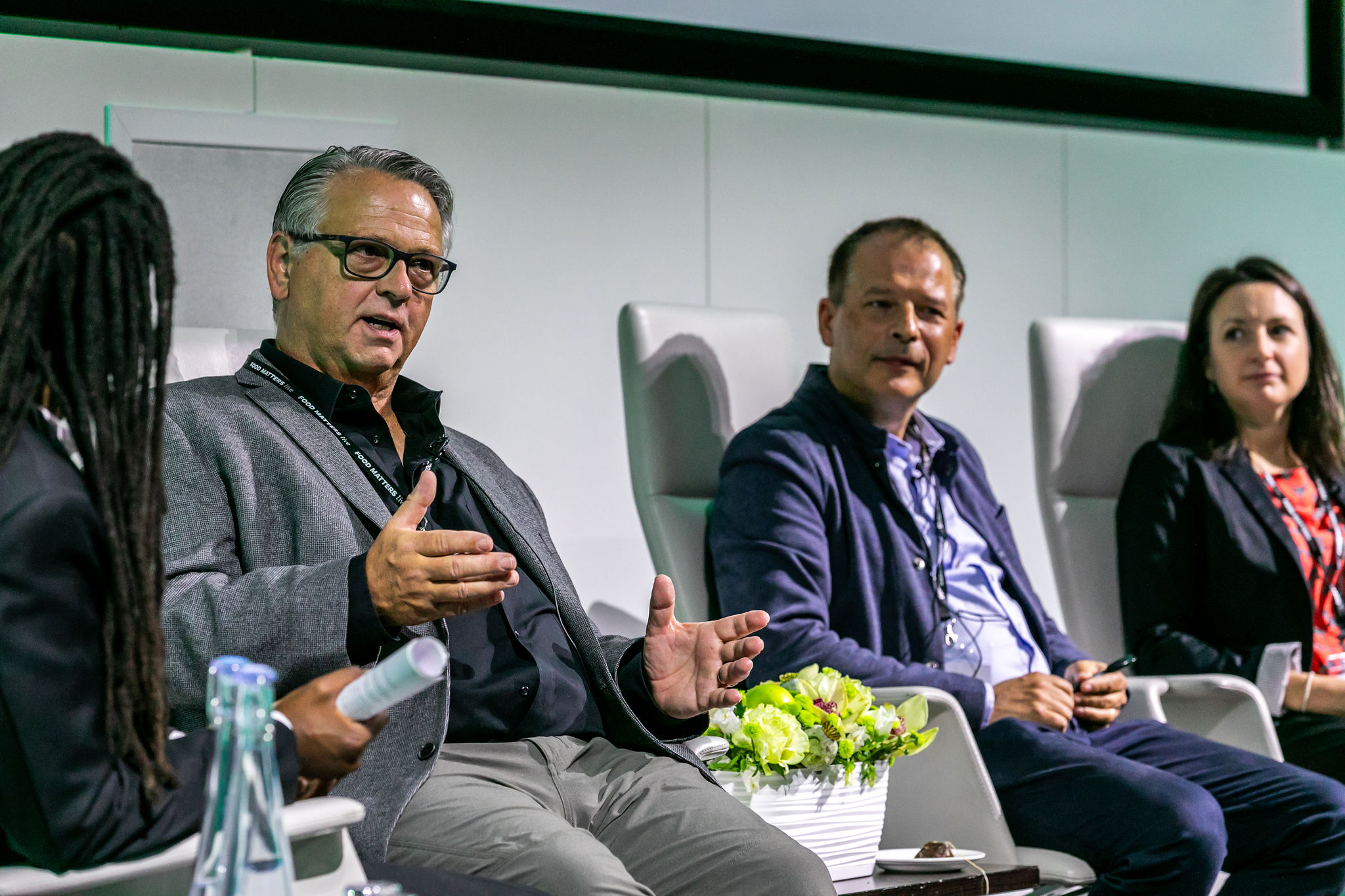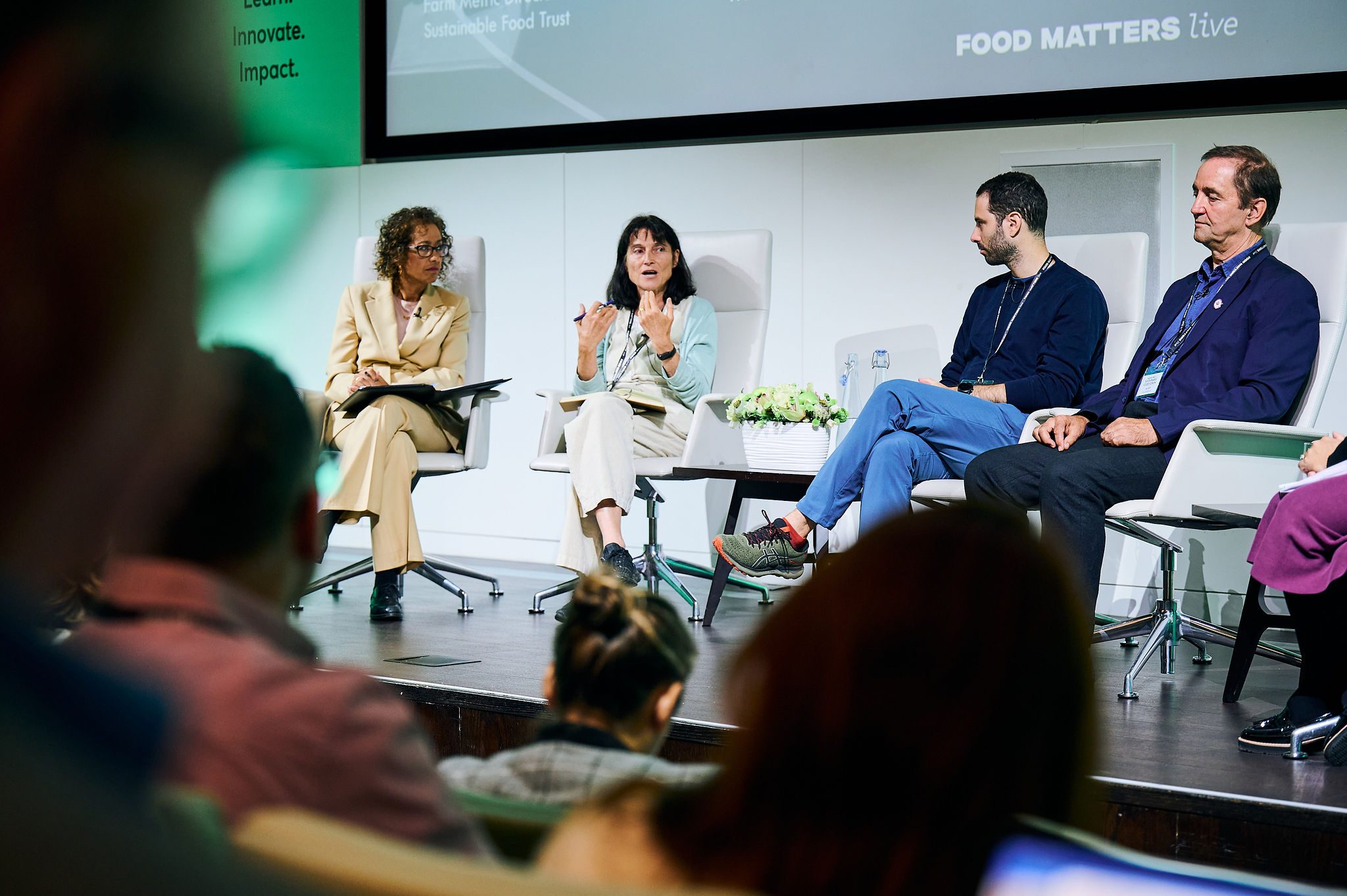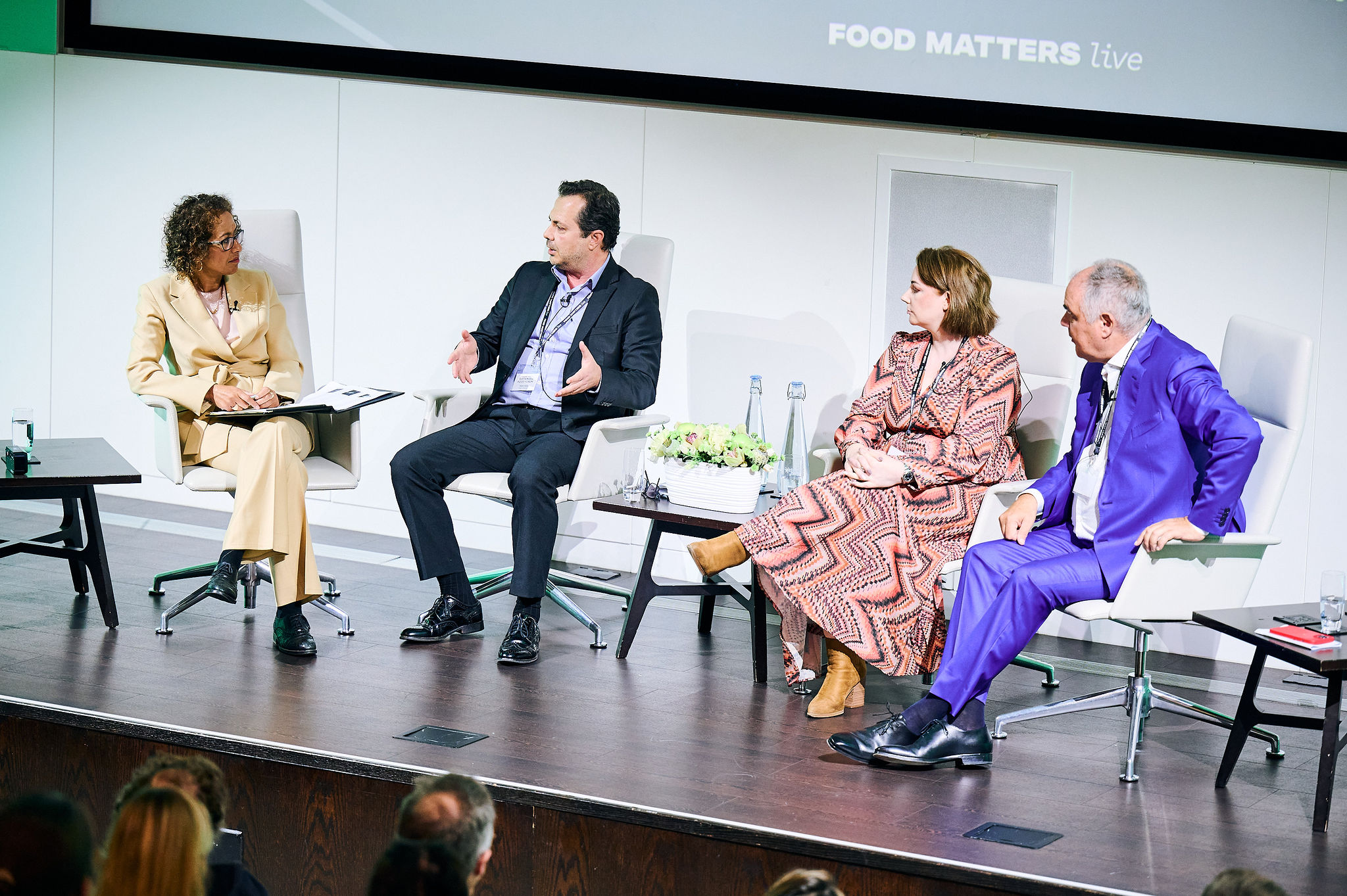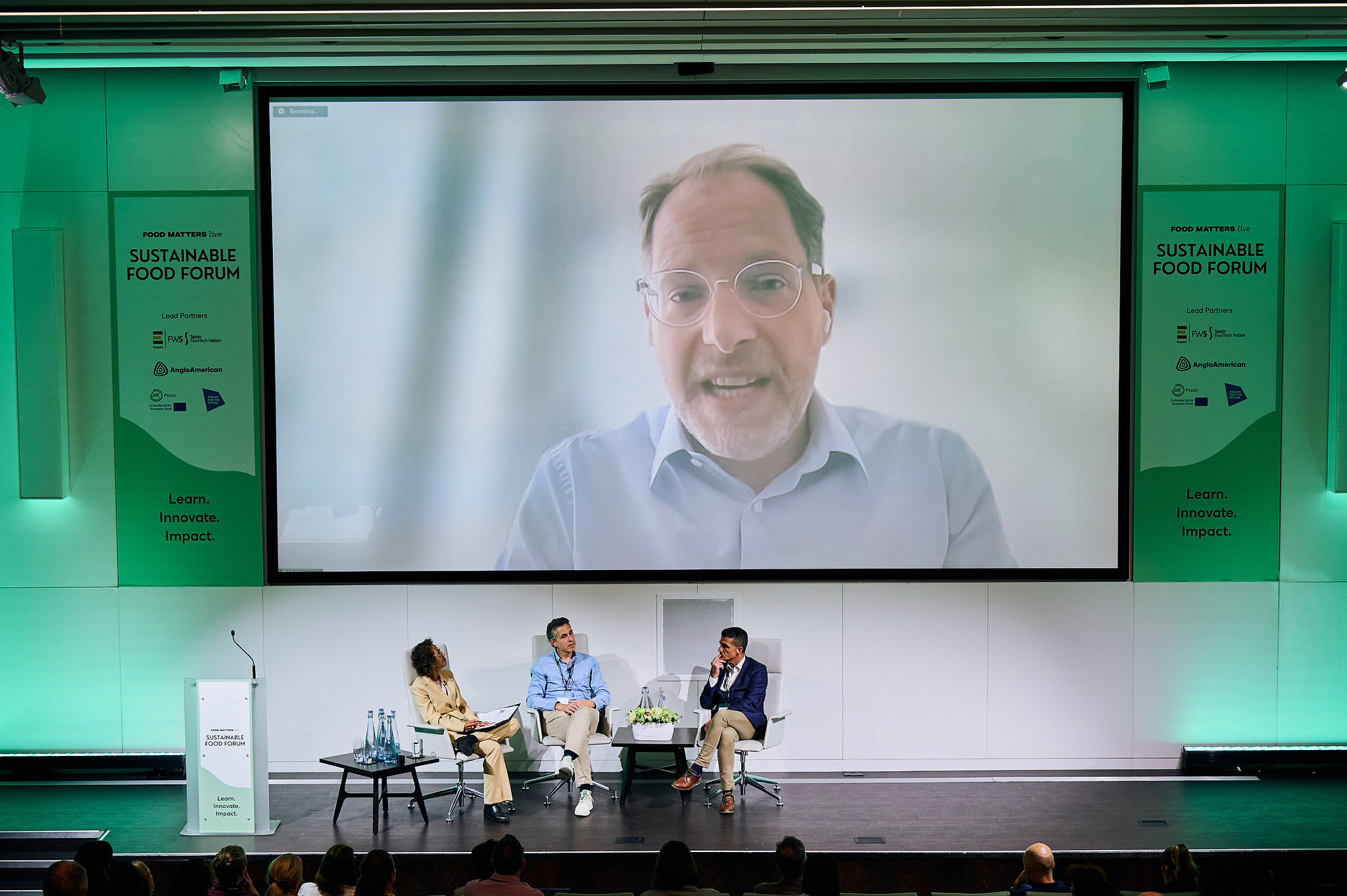
The changing face of plant-based food in 2022
The market for plant-based food and drink is undoubtedly growing, but what does that mean for the types of products we might see on the shelves in 2022?
This year’s Veganuary was the biggest ever, and Marks and Spencer alone has added 175 new plant-based products to its range this year.
But with a seemingly every-expanding customer base, how do producers understand what it is they want? How do you target what used to be niche products, when your customers have so many varied needs and desires?
And if more and more people are looking to buy plant-based, what does that do to the types of products that are being produced?
In this episode of the Table Talk podcast, Stefan Gates is joined by two experts in the market to discuss who will be buying plant-based food and drink in 2022.
Rohini Alam is Global Brand Manager for Plant Based at Nestle Professional, and Philip Linardos, Co-founder and CEO at ShelfNow offer their insights into what could be a standout year for the sector.
They look at the role big brands are playing in making plant-based more mainstream, how the pandemic accelerated changing eating habits, and they look at how consumer demographics are shifting.
Rohini Alam, Global Brand Manager for Plant Based, Nestle Professional SBU
Rohini has many years of experience in the FMCG industry and is transitioning from her current role as Category Manager for Food at Nestle Professional to Global Brand Manager for plant-based brands working across multiple markets.
She successfully launched the company’s plant-based brand in the UK Food Service Industry where the Garden Gourmet brand is going from strength to strength.
Rohini is passionate about innovation and has experience in establishing new categories, developing communication campaigns, and creating and executing long term business and brand strategies that deliver value to the consumers.
Philip Linardos, Co-founder and CEO, ShelfNow
Philip brings his experience in technology to ShelfNow to shape and develop the direction of the business. Previously, he led operations at Bizzby to transform the first on-demand marketplace for home professionals in Europe.
Furthermore, he spearheaded the sales team at DynaRisk, a cybersecurity SaaS company to scale the company within 18 months. He also brings experience in venture capital at CyLon, Europe’s first cybersecurity startup accelerator, to ShelfNow.
At ShelfNow, he heads business operations, market development and the shaping of the company’s vision, aiming to establish ShelfNow as the leading marketplace for small and medium-sized brands and retailers in Europe.
Read a snippet of the conversation
Stefan Gates: Can you sum up what the plant-based sector achieved in 2021? What is the starting point we reached going into 2022?
Rohini Alam: I think it’s difficult to reflect on 2021 or 2020 without making a reference to the pandemic that really did change the landscape of the foodservice industry. And I truly believe that the pandemic made this category more relevant than ever before. So as part of our job, we’re constantly looking at insights and data coming out. And what was very interesting to notice is that the vegan society did a survey and this survey showed that one in five Brits had reduced their meat consumption since 2019. And another interesting fact I stumbled across was that something like 63 percent of 18- to 34-year-olds were saying that they will scrutinize more what they eat post-pandemic than before. And as a result, the plant-based category, leapt forward quite a bit in 2021 and will continue to do so.
Stefan Gates: Do you think that was a slice of luck or would those changes have happened, but over a longer period of time?
Rohini Alam: I don’t think it was luck as such. I think what may have happened is there might have been a bit of an acceleration, but some of these big brands that have really helped to make plant-based more mainstream have actually been working in this space for about almost a decade, some less so. And that’s what makes it really interesting is that there’s constant innovation coming through. So I do think there’s been a fundamental kind of shift in the way we consume food today than we did a decade ago. And I think that would have happened anyway, but possibly the last two years have given it more momentum and that growth and has accelerated as a result.
Philip Linardos: I think for a while now, we’ve been seeing a lot of this plant-based movement take off, and a lot of it was initially driven by environmental sustainability: wanting to help the environment, wanting to reduce carbon emissions. And it has now been joined by another, which is very much the movement of health awareness, immunity boosting where possible, but even mood driven, meaning people wanting to invest in their mental health. And a lot of that comes from consuming foods that you’re more interested in. So that second priority that joined up with the first being more environmentally driven I would say, is a byproduct of COVID, or at least has been accelerated by COVID. So that’s really interesting because now those two priorities, if I could call them that, are working together and shifting product and NPD as we like to call it in the space.
Stefan Gates: Has it all been success, or have they been some big failures? Were there products and projects that you thought might take off, but they didn’t?
Philip Linardos: I would say some of the challenges that we’ve seen out there relate to things such as price point. A lot of this innovation costs a lot simply because it’s new, simply because it’s not yet gained mass production benefits, economies of scale and so on. And simply, it’s just not demanded at the scale we need to reduce its pricing. So that is a big issue that a lot of manufacturers are dealing with right now. At the same time, and to their defense, it is meant to be more expensive in some ways because there is equal, if not more work that goes into replicating some of those alternatives through plant-based. So it is in that sense, something that requires adoption and education from the brands point of view in order for that adoption to happen.
Stefan Gates: Do you think there are some products that have failed because they haven’t focused enough on taste? They may have started off well with their messaging, but they haven’t translated into tastes, and those products are now beginning to drift away to be replaced by new ones. If you have any examples of those.
Philip Linardos: I have come across such situations, but I would say most of the failure has usually been attributed to a product or a brand innovating in this space, but not educating the right way, not finding that product market fit, which will get the consumers over the line. It is a hard exercise, and it also comes with giving the consumers choice, educating them to something new, making sure you’re suddenly converting them in a smooth way. You can’t just expect someone who’s always been a meat eater to suddenly embrace an alternative to meat. It does need a certain, you know, transition to take place.
Stefan Gates: Do you think that a large part of the shift has been the placing of products in the supermarket?
Rohini Alam: Yes, I do. It used to be in a faraway part of the store where a handful of people will walk up and look for products. And that probably is why taste was not as dialed up as it is today. Even if you think of going into a restaurant and looking for vegetarian options they used to be towards the very end just before the sides, maybe two options. And that was your three-bean burger and a salad. I do see much more shelf space now dedicated to plant-based. I know that a lot of people are trialing having proteins in one area. So, you’ve got your red meat, your chicken and equally your plant-based proteins where it’s easy to navigate. Some big brands, be it the vegan sausage roll from Greggs, I feel, played a role in just getting plant-based products to more people.
Stefan Gates: Looking ahead now, how do you target customers who may still be eating meat but want to eat more plant-based?
Rohini Alam: I do think one of the ways that we can get people to enter the category is to make that swap very comfortable and easy. I think (because I would describe myself as a flexitarian) I’m less willing to compromise on a really good food experience and having products that enable that easy switch can help make the journey easier.
Stefan Gates: Is there enough of a growth left in the market for companies to carry on innovating in that space?
Rohini Alam: My first answer is yes, there’s absolutely growth. We’ve seen things like a burger that mimics a real beef burger, but there’s so many other types of dishes and proteins where you can still have plant-based versions. Any product using animal protein is effectively a space where you can explore plant-based alternatives, which I think keeps things quite interesting, so there’s room for growth in terms of profit. Manufacturing plant-based products involves a certain level of cost, but as the category grows, and the scale is there and as people start seeing the benefit of incorporating plant-based dishes into their diets, I believe it can absolutely be a profitable business as well.
Stefan Gates: Philip, would you agree with this? Because there’s a phenomenal amount of money that’s been invested in lots of companies that are yet to make an edible product or yet to make a marketable product. You’ve got to build enormous bioreactors. We’re not quite sure how to do it yet, but there’s still money being pumped into the sector. Do you think this is likely to ever make a buck? And how soon is it going to happen?
Philip Linardos: It’s an interesting topic. A lot of the brands, except for the big producers, all the new players are naturally young. They haven’t been running for more than three or four or five years, if not just starting up now. And so, they’re faced with a lot of distribution issues. So not only are they producing something new, something very untested, but they are also having to pitch to big retailers or even foodservice chains who are suddenly looking at them to be comparable to big brands. Often, they are requesting or demanding for terms that are impossible to be met by the smaller players. So, a lot of this comes down to the fact that unfortunately, yes, there’s a lot of money to be made, but a lot of that money stagnates or gets killed. What I’m seeing is that sadly, there is not enough goodwill from the big retailers, especially when it comes to giving these smaller players a chance. It is a hard market to penetrate.
Stefan Gates: What about gaps in the market? Where are the are as that you think there’s work to be done? The low hanging fruit for new products, new flavours. What are you looking at?
Rohini Alam: I think a starting point is looking at sources of animal protein and working on having plant-based versions of those available. I think in terms of some of the products like the burgers, those have been around for a while and it’s already spread beyond burgers to other meat alternatives like your sausages or your chicken nuggets and so on. But at the same time, there’s all these other areas of animal protein where you can have options. Milk is one that’s been around for a while now, but there’s interesting things around egg and seafood. And then, of course, there’s this whole other segment around having products that simply hero vegetables, which is equally exciting. But, having alternatives to meat I think will continue to be the way that we can encourage more people to try plant-based, and there’s still a lot of room for innovation in that space still.
Philip Linardos: I’d love to see how seafood is innovated upon. I know there’s already been an effort from the bigger players. I’m very curious to see it from the small, medium sized players. I feel like it’s been a little more quiet and up and coming. In my opinion, we will also see condiments. So that is something we’re tracking and following because the whole idea is that the plant-based does not just disrupt the obvious animal based food, which is meat, but also any production that touches on some source of animal, right, even alcohol. Rohini, you made a fantastic point that we need to tackle the space through the obvious animal protein. It’s meat, it’s fish. It’s what people can associate with an animal. Rather than knowing that in wine, sometimes there’s a refinement process that’s not vegan. In that sense, we do need that bigger elephant in the room to be addressed for the niche activities to take place afterwards.
Stefan Gates: Do you think that the consumer is going to change over the next year or two?
Rohini Alam: A few years ago, there was (and perhaps still today) an obvious skew towards a younger consumer base who are more aware of environmental concerns or have more of a strong view around animal welfare. Now there’s also a heightened awareness among the older consumer base because now almost all of us find ourselves with some, either ourselves or somebody within our quite close social circle, following a plant-based lifestyle, and that influences is spreading. What we’re finding is that for a lot of people, they’ve somehow found themselves in this space where they are now more experimental with plant-based products, whether it’s cosmetics, whether it’s food, anything. There’s also more education in schools, around sustainability, around climate change, around all the different things that impact our lives. And I think as a result, younger kids today have more awareness of the impact of their choices than we did when we were in school. And that’s why I think actually this fear will spread both ways with younger people coming into these plant-based categories. And equally, older people may have different reasons driving their choices, but I think both ways will happen.
Stefan Gates: Do you think that funding within companies is going to shift from meat to plant-based analogs? Do you think that literally the availability of funds and the and the activity that companies do is going to shift on a on a fundamental scale?
Philip Linardos So this redistribution of production priorities, R&D and funding, like you call it from a manufacturer’s point of view, I think only applies to larger players that have previously been for many years in meat, for example, and are now actually launching lines of meat alternative, which is fascinating. Some switch completely. So they just go vegan, for example, plant-based, let’s call it. Others retain both lines. And I’ve encountered those players, which is interesting because it’s like saying we do believe in both. We’re trying to reduce our other line. We need to keep afloat, but our bodies and our ethics are going towards plant-based, which can be confusing for a consumer because obviously they don’t want to associate themselves with someone who’s a meat producer.
Stefan Gates: My final question then for both of you is, what would you advise people to do if they’re thinking about moving into plant-based?
Philip Linardos: I think the trade, whether in foodservice or retail, needs to open up more of a dialog with brands out there to understand what it is they’re creating. Their consumers may not even know what’s coming. So, in some ways, I think there’s a real edge to the retailers opening up a line of communication with brands. They don’t have to buy from the brands, if they just get closer to them, they’ll learn a lot. Vice versa. Obviously, brands must get close to those retailers to educate them, and get them to sample their food and beverage and they’re NPD. But in terms of other things that they could do, I would say they can, let’s say we’re talking about retail, they can bring those brands down to their stores to talk about what they do directly to the consumers, rather than have to suddenly become experts in all those new fields. I think they need to just get closer to the brands themselves and allow them to tell their story, their journey, what it is they’re disrupting directly to the people coming into their store and shopping. So it is really about bringing trade suppliers or manufacturers in this case and consumers closer together rather than apart and sort of regurgitating each other’s messages. I think that is one tip I would give.
Stefan Gates: And in terms of the people that you work with, what are the classic mistakes that they might have made if they hadn’t had your expert advice?
Philip Linardos: I don’t think it’s necessarily mistakes. I think it’s a very new thing that a lot of retailers and foodservice buyers are trying to get ahead of. Sometimes they’re deterred. The trade buyers are deterred by seeing either limited choice or high pricing. Which can be off putting and simply non-viable or right for their business. It’s quite fragmented. There are dedicated wholesale efforts now that are happening in those spaces, but it’s quite new movement. And so, to the defense of trade, they need more help. And you know, whoever is in the distribution business, in the wholesale business, we need to we need to get that access to them so they can discover that can learn what options they have. If something has seemed to be very expensive or simply not interesting, maybe there’s something else out there for them. There’s much more education to be made here. And transparency, I guess, is what I’m trying to get to. So that is really what I hope the sector can start having more of.
Stefan Gates: Slightly different for you Rohini, what I’d like to know is what surprised you about the plant-based market? Was there anything that you looked and you thought, I never realized the technical aspect would be this this confusing? The consumer understanding was so vital. Was there any particular shift that you had to make when you entered the plant-based sector?
Rohini Alam: First of all, I had I had no idea how much was already happening in the category. I think we are quite fortunate to be in a market that actually is quite advanced. If you think about the rest of the world and then what’s happening in this category there, there are lots of different markets at very different stages, but I think we’re quite fortunate to be in one where there is quite a lot happening. There’s lots of options. And one of the big surprises for me was when I took on this job to launch this brand and I tried some of the products. Before that, I hadn’t really tried plant-based versions of things like burgers and sausages. And it was almost like a bit of a mind game where I’m biting into something and it tastes like meat. But my mind is telling me that it’s not. I had to get my head around it. And I found it absolutely fascinating. I then started trying to get my hands on whatever product I could. I love attending the different kind of innovative events and exhibitions that happen in the category. I subscribe to a lot of information and news and research around the category just simply because I’m interested as a consumer. The bit that I really like about what I do is just making it very easy and accessible and inclusive so that anybody who feels like they want to try it out can in a very non-judgmental way, if that makes sense.
Stefan Gates: Well, I’m really excited to find out what’s going to happen in the future over the next few years and when will we reach peak plant-based? I’m not sure if we ever will possibly know but thank you so much for joining me.








